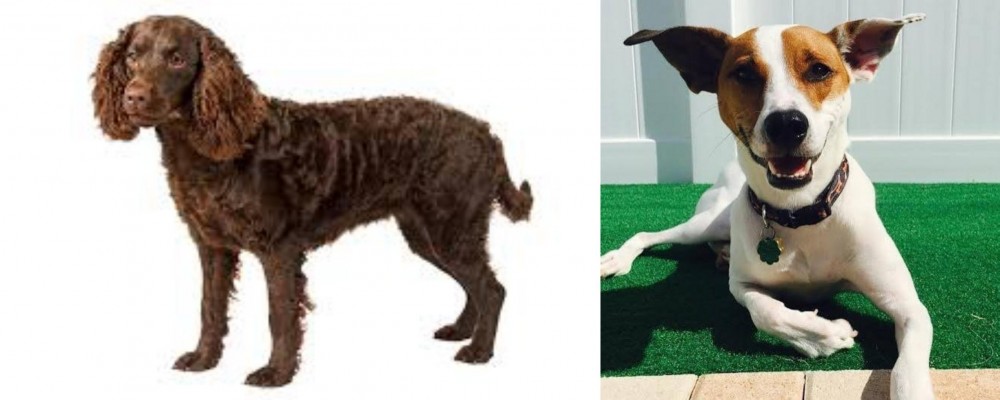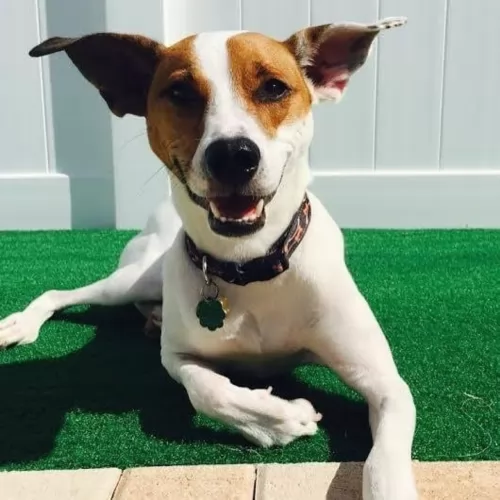 Petzlover
Petzlover Both American Water Spaniel and Feist are originated from United States. American Water Spaniel may grow 10 cm / 3 inches shorter than Feist. Both American Water Spaniel and Feist are having almost same weight. American Water Spaniel may live 4 years less than Feist. Both American Water Spaniel and Feist has almost same litter size. American Water Spaniel requires Moderate Maintenance. But Feist requires Low Maintenance
Both American Water Spaniel and Feist are originated from United States. American Water Spaniel may grow 10 cm / 3 inches shorter than Feist. Both American Water Spaniel and Feist are having almost same weight. American Water Spaniel may live 4 years less than Feist. Both American Water Spaniel and Feist has almost same litter size. American Water Spaniel requires Moderate Maintenance. But Feist requires Low Maintenance
 The American Water Spaniel was developed in the United States. He is the state dog of Wisconsin and was developed there in the 19th century. The bloodlines of this spaniel are varied but certainly include the English Water Spaniel and the Irish Water Spaniel. Even though they are the state dog of Wisconsin they were almost extinct when Dr. Fred J. Pfeifer rescued the breed. The numbers had fallen after World War II because hunting was now a recreational sport and not needed to provide food for the family. He then started a breed club and wrote a breed standard, both of which were recognized by the United Kennel Club and the American Kennel Club.
When first developed the American Water Spaniel was known as the American Brown Spaniel. It was bred with a curly, thick coat so that it cold be sustained in Wisconsin winters and cold water. It was bred to hunt grouse, water fowl and prairie chickens as well as furry land animals. Pfeifer advertised his dogs for sale everywhere using a mailer that read: “, "The American Brown Spaniel is distinctively an American production. Hunters have known this type for years and it was through their efforts that this dog was propagated.... For years we have bred only selective stock, breeding for gameness, stability, courage, intelligence, and beauty. They are dogs to admire and trust under all conditions whether in the home circle or in the field with the outdoor man."[2]
The American Water Spaniel was developed in the United States. He is the state dog of Wisconsin and was developed there in the 19th century. The bloodlines of this spaniel are varied but certainly include the English Water Spaniel and the Irish Water Spaniel. Even though they are the state dog of Wisconsin they were almost extinct when Dr. Fred J. Pfeifer rescued the breed. The numbers had fallen after World War II because hunting was now a recreational sport and not needed to provide food for the family. He then started a breed club and wrote a breed standard, both of which were recognized by the United Kennel Club and the American Kennel Club.
When first developed the American Water Spaniel was known as the American Brown Spaniel. It was bred with a curly, thick coat so that it cold be sustained in Wisconsin winters and cold water. It was bred to hunt grouse, water fowl and prairie chickens as well as furry land animals. Pfeifer advertised his dogs for sale everywhere using a mailer that read: “, "The American Brown Spaniel is distinctively an American production. Hunters have known this type for years and it was through their efforts that this dog was propagated.... For years we have bred only selective stock, breeding for gameness, stability, courage, intelligence, and beauty. They are dogs to admire and trust under all conditions whether in the home circle or in the field with the outdoor man."[2]
In Wisconsin, around the wolf River and the Fox River, hunters were looking for a water dog that could also hunt on land. They needed a dog that could work a variety of fowl and game but who was small enough for a skiff and strong enough for the artic water temperatures of Wisconsin in the Winter. So, in addition to the spaniels named above, other breeds such as the Curly Coated Retriever, the Poodle, Native Indian dogs and the Sussex Spaniel were intermixed. When first developed the American Water Spaniel was known as the American Brown Spaniel. It was bred with a curly, thick coat so that it cold be sustained in Wisconsin winters and cold water. It was bred to hunt grouse, water fowl and prairie chickens as well as furry land animals. The American Water Spaniel was then itself used to develop another new breed, the Boykin Spaniel. In 1985 Wisconsin declared the American Water Spaniel to be the official state dog. Even so there remain only a few thousand dogs in existence. Though recognized by the AKC, they are neither spaniels nor retrievers and remain unclassified. Because of this they cannot compete in AKC field trials, but they do compete in AKC hunt tests. Though rare, the American Water Spaniel is a great hunting dog, retriever and companion.
 The Feist is a small dog from the United States, coming from Terrier dogs which were brought over to the States. It is believed that these Terriers included crosses between several terriers – the Manchester Terriers, Smooth Fox Terrier and English White Terrier – dogs used as ratters and known for their skills in killing rats.
The Feist is a small dog from the United States, coming from Terrier dogs which were brought over to the States. It is believed that these Terriers included crosses between several terriers – the Manchester Terriers, Smooth Fox Terrier and English White Terrier – dogs used as ratters and known for their skills in killing rats.
The Feist isn’t a new type of dog and in fact there are records of the dog which go back centuries. George Washington even referred to them in 1770 already, and the breed was popularized by President Teddy Roosevelt, who hunted with his Feist.
 The American Water spaniel is a midsized, muscular dog. There is nothing flashy about his looks or his work performance. He is however a consistent, competent swimmer and hunter. His brown coat is wavy or tightly curled, waterproof and dense. His feet have thick pads and webbed toes. The AWS is intelligent, happy, and easy going. He is a very versatile hunting dog on land and in water. The breed has not changed much since it originated in the 19th century. They can be liver, chocolate or brown. The eyes should be the same as the color of the coat. They have broad skulls with wide, long ears and an undocked tail.
The American Water spaniel is a midsized, muscular dog. There is nothing flashy about his looks or his work performance. He is however a consistent, competent swimmer and hunter. His brown coat is wavy or tightly curled, waterproof and dense. His feet have thick pads and webbed toes. The AWS is intelligent, happy, and easy going. He is a very versatile hunting dog on land and in water. The breed has not changed much since it originated in the 19th century. They can be liver, chocolate or brown. The eyes should be the same as the color of the coat. They have broad skulls with wide, long ears and an undocked tail.
They have a square, medium sized muzzle and wide nose. They have a bite that is level or scissors. The legs of the muscular American Water Spaniel are medium in length and the tail is full, with a medium length, curved and feathered. The dewclaws might or might not be removed.
 Standing at about 46cm to 56cm in height and weighing in the region of 10 to 15kg, the Feist is a short haired dog that doesn’t shed much and he is not hypoallergenic.
Standing at about 46cm to 56cm in height and weighing in the region of 10 to 15kg, the Feist is a short haired dog that doesn’t shed much and he is not hypoallergenic.
The coat of the dog is available in a variety of colors but they are essentially a bi-colored dog such as red and white, tan and white, black and white, while solid colors are fawn, white, light brown, black and brindle too.
Perhaps because of so many genes being involved with this dog, it is more easily identified because of its hunting abilities. He is a sturdy dog with a medium length tail which he holds up. Some Feist owners prefer the look of a docked tail and then docking is between the second and third joint of the tail. The Feist has erect or semi-erect ears.
Intelligent and alert, the Feist is a dog that will respond well to training. As with any other dog, training and socialization will be important for him so that he is obedient. He is energetic, curious and alert and above all he wants the attention of his human family.
 Bred to work the American Water Spaniels are loyal to their people, want to please them, but are not so great with strangers. They are stubborn and love to be the center of attention. They are often one person or one family dogs. They need an owner who is the pack leader and willing to put in the time to train them. However, they are a versatile breed and need variety in training and activities rather than repetitive activities. They are prone to resource guarding, slow maturation and dominance. These negative traits are dissipated with a strong leader, good training and a lot of daily activity. They are sensitive as well as stubborn. Do not use a punishment-oriented training with them. They will respond out of love and loyalty or not at all. This is a breed that wants to be the alpha over the people and will do so if you let him. Keep them fenced as being hunters they love to wander and will leave home whenever they can.
Bred to work the American Water Spaniels are loyal to their people, want to please them, but are not so great with strangers. They are stubborn and love to be the center of attention. They are often one person or one family dogs. They need an owner who is the pack leader and willing to put in the time to train them. However, they are a versatile breed and need variety in training and activities rather than repetitive activities. They are prone to resource guarding, slow maturation and dominance. These negative traits are dissipated with a strong leader, good training and a lot of daily activity. They are sensitive as well as stubborn. Do not use a punishment-oriented training with them. They will respond out of love and loyalty or not at all. This is a breed that wants to be the alpha over the people and will do so if you let him. Keep them fenced as being hunters they love to wander and will leave home whenever they can.
 Loving to be around his human family and being a devoted and loyal canine friend, the Feist is also an intelligent, energetic dog who is fairly easy to train.
Loving to be around his human family and being a devoted and loyal canine friend, the Feist is also an intelligent, energetic dog who is fairly easy to train.
Bright and alert he makes a good watchdog too, but is amicable enough to get on well with other pets in the home as well as with children.
He can be stubborn so training and socialization will be important for him. As it is, he likes a firm, strong owner and in exchange for good care, he will become your devoted, loyal friend.
 A Feist is a robust dog who doesn’t have any particular health issues, and with good care he can reach 18 years of age if looked after well. Hip Dysplasia is such a common dog illness that it always bears mentioning.
A Feist is a robust dog who doesn’t have any particular health issues, and with good care he can reach 18 years of age if looked after well. Hip Dysplasia is such a common dog illness that it always bears mentioning.
This is a ball and socket joint problem where the joint doesn’t function smoothly and the grinding of the bone leads to pain and arthritis for your pet. You'll notice he battles to play games anymore and he also battles to get up after lying down. You need to know that this disease isn’t reserved for old dogs but can start while your dog is still a puppy and that it can lead to lameness.
Look out for allergies in your dog as they can cause a host of problems which can include his skin, his breathing and problems with digestion. Typical symptoms of a dog with allergies include sneezing,scratching and very distressing for a dog, itchy and red skin which can eventually ooze.
As a responsible dog owner it is imperative when you detect problems with your dog, to get him to the vet immediately.
 Feeding the American Water Spaniel is no mystery. They need a high quality dry dog food with an eye toward calorie consumption. Some AWS have a tendency to become obese. Treats are important to the AWS in training but can add to the obesity concerns.
Feeding the American Water Spaniel is no mystery. They need a high quality dry dog food with an eye toward calorie consumption. Some AWS have a tendency to become obese. Treats are important to the AWS in training but can add to the obesity concerns.
Like other isolated breeds that were bred true, the genetic issues we see in many other popular breeds are not seen as much in the American Water Spaniel. They do however have a few issues to contend with.
Eyes: These issues appear to be inherited with progressive retinal atrophy and cataracts. Many AWS that develop cataracts do so at a very young age, usually under a year. Metabolic: Diabetes, hypothyroidism, glandular disorders and epilepsy. Baldness and Cardiac Issues. Orthopedic: Hip dysplasia. There is no evidence to suggest any elbow dysplasia. Additional concerns are hypothyroidism, allergies, epilepsy, diabetes and glandular disorders which Of course, the American Water Spaniel is an athlete who loves to be outdoors. He loves to swim, run and hunt. He needs daily exercise, or he can become loud and destructive. They thrive on having a job and they are not happy if they don’t have one. They are good at agility, obedience, dock diving and field trials. They also enjoy flyball and barn hunt.
 Grooming your Feist dog isn’t going to be costly or difficult at all, as with his short, smooth coat he will essentially only require a brush twice a week.
Grooming your Feist dog isn’t going to be costly or difficult at all, as with his short, smooth coat he will essentially only require a brush twice a week.
It’s good to get into the habit of brushing him as not only does it keep his coat sleek and shiny, he loves you paying him attention.
All dog owners need to know that grooming goes beyond just brushing the coat. You want to also check his nails that they are short, check in and around his ears and brush his teeth with special dog toothpaste and toothbrush.
Give your Feist the very best dog food there is. Home-made is always good but if you feed him commercially manufactured food, make sure its a quality one. Some raw meat added in every now and again is important for his health. Ensure fresh, cool water is available to him around the clock.
Your Feist is an energetic dog that has been accustomed to hunting and running down small prey. He is an outdoor dog, thriving on fun and games. Take him on your walks, your hikes or when you go cycling or swimming. He wants to be right there with you involved in everything. While he can slot into life in the city or the countryside, he isn’t an indoor dog and it certainly won’t be good for him if you keep him cooped up in a tiny garden and pretty much forget about him.